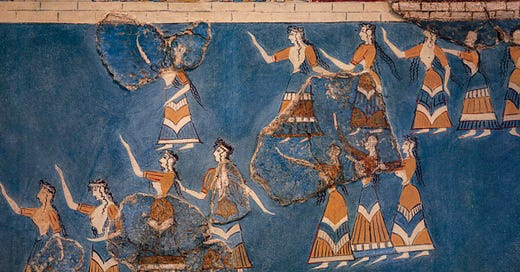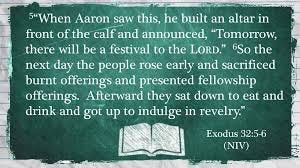IS THERE A RIGHT WAY TO WORSHIP THE DIVINE? KORACH
What is Inside the Community and what is Outside?
Parashat Korach (Numbers Chapter 16-18) is the description of a challenge to the leadership of Moses. Korah’s challenge is of course defeated in a highly memorable way. Here’s the story.
Moses responds to Korah’s challenge to his leadership by proposing a test to see who has YHVH on their side. This is a familiar theme: we saw it in the contest with Pharoah’s Egyptians, we will see it later in Chapter 17 when Aaron’s staff blooms and no one else’s does proving that he is blessed by YHVH (17:17-23), and in the famous story of Elijah’s contest with the prophets of Baal.
“In the morning, YHVH will make known who is His and who is holy…and he will bring the one he chooses close to Him. Do this, take incense burners, Korah and all his congregation, and put fire in them and set incense on them in front of YHVH tomorrow. And it will be that the one whom YHVH will chose, he will be the Holy one.” (16:5-7).
They all assemble the next morning in front of the tent of meeting “and YHVH’s glory appeared to all the congregation” (16:19). Then Moses says “But if YHVH will create something and the ground will open its mouth and swallow them and all that they have, and they will go down alive to Sheol, then you will know that these people have rejected YHVH.” (16:30). That’s precisely what happens, the earth opens up and swallows the rebels and their families and all of them die. (16:31-34)
Is there one right way to worship the divine and what makes something a wrong way? Korah says to Moses and Aaron “You have much. Because all of the congregation, all of them are holy and YHVH is among them. And why do you raise yourself up over YHVH’s community?” (16:3). Nahmanides, a prominent medieval commentator, argues that what has been taken from Korah, Dathan and Abiram is the right to offer sacrifices that they used to be able to offer as the eldest in the family (commentary on 16:3). Korah is a Levite, but he is not a priest (16:8-10). This apparently means that he is not part of Aaron’s family, and thus there are priestly things that he cannot do because they are reserved to Aaron’s family. Dathan and Abiram are from the tribe of Reuben. They previously had able to offer sacrifices as clan heads, but are disenfranchised from making offerings in this new way of worshipping YHVH.
Korah is NOT rejecting YHVH, but rather a certain way of worshipping YHVH, following Nahmanides. We’ve seen this with the Golden Calf. The community absolutely believed they were worshipping YHVH by dancing around the Golden Calf—they declared it a festival for YHVH (Exodus 32:5). Aaron and Miriam’s complaint in Numbers 12 is the same—they are not rejecting YHVH but complaining about how Moses, in their perception, is hogging the attention of YHVH and acting as the only prophetic spokesperson of the divine (12:2)
Korah and his followers, and previously the people in the Golden Calf incident and Miriam and Aaron—they are all rejecting a change in the worship of YHVH. Indeed, “and all the congregation of the children of Israel complained the next day against Moses and against Aaron, saying “you killed YHVH’s people.” (17:6). This sounds much more like a rejection of a certain way of worshipping YHVH than a rejection of YHVH.
Why is this significant for us reading this text more than two thousand years later? It raises the key question of the boundaries of what is permissible worship or what is inside the community and what is not. For instance, Jesus was undoubtedly born and died a Jew, but the Messianic Jews who worship Jesus as divine and wear tzitzit seem to me to be outside of the bounds of Judaism. There’s this whole group of them that belong to a Facebook group of Jewish homesteaders. Whenever they post about Jesus as Messiah, I’m like, what are you doing in this group? They may call themselves Jews and want to come and participate and proselytize at Jewish events, but the idea of calling them Jews leaves me completely queasy.
On the other hand, what about the idea of worshipping YHVH and his consort Asherah by dancing around an Asherah tree in a sacred grove? Our ancestors absolutely believed in and did this as testified to in the archaeological evidence and in the denouncing of these practices throughout the Hebrew Bible. If I posted on Facebook something like “Full moon worship of YHVH and His consort Asherah. We’ll livestream a dance and invite you to join in by dancing in your backyard” most or almost all mainstream Jews would be as queasy about that as I feel about Messianic Jews.
We’re seeing this in some of the arguments about Israel. There are voices, including people who would usually be thought of as moderate, such as Yossi Klein Halevi and Danny Gordis who want to excommunicate organizations like Jewish Voices for Peace and other anti Zionists. I think excommunicating them is dreadful and wrong, even as I disagree with them. Then I am forced to accept that people like Ben Gvir and Smotrich, out and out racists, are my brothers—and that is profoundly uncomfortable.
We live in a time where the fundamentalist instinct is to tighten boundaries and I can say with great confidence that this will be bad for the Jews—because it has always been. Yet I find myself in a small minority of my community, a profoundly uncomfortable place.
Where are you uncomfortable as a Jew in our world today?






